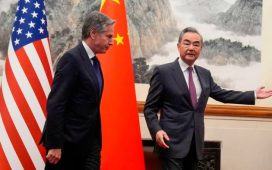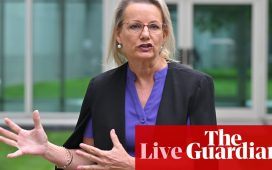Full Story: Guardian Australia’s tri-weekly podcast was launched in October, featuring the best of Guardian Australia’s reporting – and the stories behind the scoops.
If you’re not sure where to start, or if you’ve missed a few, Guardian staff have picked their favourite episodes for your summer road trips.
You can subscribe to Full Story free on Apple Podcasts, Spotify or any other podcasting app.
Lenore Taylor, editor: Robodebt is preying on the vulnerable
In this early episode, Luke Henriques-Gomes was able to clearly explain the human cost of this deeply flawed policy because he had been doggedly pursuing it for years. The episode includes audio tape from one robodebt recipient, Clare, and her Kafkaesque battle with the bureaucracy as she tried to get some answers.
Luke’s analysis and explanation and Clare’s recordings combined to allow listeners to really understand the harm this policy was causing.
Is the Coalition profiting off Australia’s most vulnerable people with its robodebt scheme?
Katharine Murphy, political editor: Facebook is a hate factory
As a group of reporters, we’ve done a lot of work this year on Facebook and the impact digital platforms are having on democracy and political discussion. This episode unfurls a forensic investigation – by Chris Knaus, Michael McGowan and Nick Evershed in Australia, and Oliver Holmes in Jerusalem – into the commercialisation of hate on Facebook.
The episode documents an important story, but what I love about this particular pod is it shows our methods. This is old-fashioned, shoe-leather journalism conducted in the digital age, and listeners are invited along for the ride.
The hate factory: unmasking a far-right Facebook network

Laura Murphy-Oates, Full Story host: Central Australia is becoming too hot for humans
This episode – about extreme heat in the central desert, reported by Indigenous affairs editor Lorena Allam – is an important explainer on issues that have plagued Indigenous communities in the central desert for decades, such as poor housing, overcrowding and chronic health conditions. The revelation at the heart of this story – that extreme heat is compounding these problems and could mean Indigenous people will become Australia’s first “climate refugees” – is startling, and should be a wake-up call for state and federal governments.
But this isn’t the first time these communities have faced forced migration from their home. The Pintupi people, first driven out by the government, are now facing a future where their home is rendered “unliveable” due to extreme heat.
This really is incredible reporting by Lorena, and a gripping story, where the climate crisis meets poor policy and systemic discrimination.
Is central Australia becoming too hot for humans?
Bridie Jabour, opinion editor: the truth about ageing
Narrative journalism is, of course, supposed to make you think – but the episode on ageing with Lucy Clark and Charlotte Wood literally stopped me in the street.
Wood’s new novel, The Weekend, tells the story of three women in their 70s who come together after their mutual friend has died. This book was the jumping-off point for the episode, but the conversation delved much deeper. I haven’t heard women speak so frankly about the small terrors of getting older and how it can change friendships – but also what there could be to look forward to.
It wasn’t a traditional “news” episode but I was so struck by it I stopped walking so I could listen properly. It made me look at the people around me differently.
What is it about ageing that’s so confronting?
Josephine Tovey, associate news editor and columnist: what is it like when someone you love dies in prison?
From the opening minutes of this episode about the death in custody of David Dungay Jnr, I could feel my insides start to crumple. It begins with a recording of the last phone call between David, a 26-year old Dunghutti man and prisoner in Long Bay jail, and his sister Cynthia.
“You’re right but, eh?” Cynthia says.
“Yeah I’m right,” David responds.
“Being strong?”
“Yeah, being strong.”
“Ring up tomorrow?”
“… alright then sis I’ll ring tomorrow. Love ya.”
That same day, Corrective Services stormed David’s cell while he was eating a packet of biscuits and, six minutes later, he was dead. The Guardian followed David’s family’s quest for justice for three years, and this episode brings together the most important moments from the Breathless podcast and our reporting on the case. Sensitively told by reporter Miles Herbert, this story is both deeply intimate – taking us into the Dungay family’s sorrow and anger – while also tapping into a critical wider global story about the Black Lives Matter movement.
What is it like when someone you love dies in prison?
Gabrielle Jackson: what’s the big deal about birds?
This is my favourite – not because Bird of the Year is like Christmas to me (only better) but for the surprising emotional journey it took me on. What I love about this episode is that it exposes listeners to real joy – and sadness – while maintaining an important message.
I loved the listeners who rang in to tell us their bird stories: the woman who saw a magpie flying around with a golf ball in its mouth; the man who got chased by emus; the woman whose bird friend loved shiny things and brought her a carving knife as a gift. The episode made me laugh out loud (listen out for BirdLife Australia editor Sean Dooley’s red-carpet moment) and also cry – you will never forget the listener who shares a story of a letter written to him by his mother.
This episode made me cherish Australia’s natural history – its abundant, rare and beautiful birdlife – and showed me how our relationship with these birds could very well be the antidote to the anxious times we live in.
What’s the big deal about bird of the year?
Steph Harmon, culture editor: Fatbergs are disgusting
“I went underground, deep into Sydney’s wastewater, to try and find a fatberg in the wild,” begins Naaman Zhou. What follows is 15 minutes of fascinating, distressing detail about the giant, congealed balls of filth, fat and wet wipes that are clogging our sewers – the musk of which Zhou describes using a perplexing intersection of rating systems: “6 our of 10 on the smell scale” or “three or four dog poos”.
I learned a lot: that Will Smith and Will.I.Am are partially responsible; that sewerage staff can be colourfully described as “fatberg spelunkers”; and that normal disposable toilet paper isn’t good enough for precious young men, who have been wiping their butts with moistened fabric instead.








